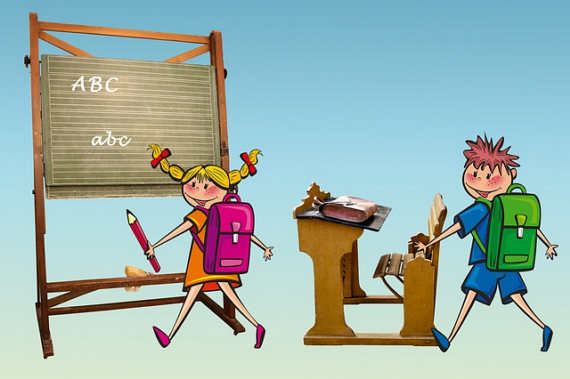
When my daughter was about 8 years old, her teacher Sarah, phoned me one afternoon and said that she wants to share with me an event from my daughter’s class.
Sarah said that she asked the children, “What should one do in order to have a good life?”
One pupil said, “To have enough sleep”, another said, “To eat healthy food”, another pupil said, “To be very rich, and go wherever I want”, and my daughter said, “To think positive thoughts”.
Sarah told ne that she didn’t expect such an answer from an 8 years old kid, and asked my daughter “What do you mean when you say positive thoughts?” and my daughter answered, “I always hope for good outcomes, and if I fail that’s a sign to learn better, and try again and again until I succeed”.
“I believe that you speak about positive thinking at home, otherwise, I cannot understand where she got these ideas,” the teacher said to me.
“Yes, we speak about positive thinking at home,” I said. “Would you like me to speak with the children about this topic?” I asked.
“Yes, I would appreciate it very much.” Sarah, the teacher said.
Thinking Positive Thoughts
A few weeks later, the teacher invited me to my daughter’s class to speak with the children about “thinking positive thoughts”.
Weekly lessons with stories, insights, and practices, to help you step beyond the daily, ordinary life, and awaken greater awareness.
👉 Explore the Inner Awakening Lessons
After being introduced, I started my conversation with the children by asking them a few questions.
“When you play competitive games in the schoolyard, do you expect to win or lose the game?”
“Win, win, win,” exclaimed all the children.
“At gymnastics lessons, do you compete against each other?”
“Of course we do,” said both the teacher and the children.
“Raise your hands if you want to be the best in any game?”
All the kids raised their hands.
“But, it is impossible to expect success all the time, so why do you continue playing and competing if you know that you might lose?” I asked.
There was some embarrassment in the class, and then one kid got up and said, “Sports is fun, I enjoy playing games. They are not something important, and I don’t care if I win or lose.”
“You say that the games are not important, yet you do your best to win, right?”
“You run as fast as you can, you try to throw the ball as far as you can, you try to jump as high as you can, and I am sure that some of you play basketball and try to score as many points as you can.”
“You always try to do your best, and hope to win, even though you might lose. Right?”
I could hear the wheels of the children’s mind running. They were confused.
Then I said. “When you play at the schoolyard, you have a positive attitude while playing. You do your best to win, even if you are not good players, and if you lose, you move on and forget about it.”
And I continued. “Did any one of you thought to avoid participating in a game, because you thought you were not good enough?
“Never” said the children.
Reading about positive thinking is inspiring — but living it changes everything.
Our Positive Thinking Course gives you a step-by-step system to reprogram your thoughts, strengthen optimism, and create the life you truly want.
Don’t just think positive — become positive.
👉Start the Course Today »
“So you see,” I continued, “You all have within you a positive attitude.”
I saw a few children smiling. They understood that they were doing something right, and were content.
“Can you explain what negative thinking is? Asked Sarah.
“Negative thinking means expecting difficulties and disappointments and failure, while positive thinking means expecting positive results and contentment.”
I continued speaking about positive thinking for a few minutes, and then answered a few questions that the children asked.
Positive Attitude
When the bell rang and the children left the class, the teacher thanked me, and then said:
“I don’t think that it is logical and realistic to expect that every plan and action would turn out well. Plans don’t always work out as you wish. Why should I lie to myself, and think that everything would always turn out well?”
I looked at the teacher and said:
“Expecting success and positive outcomes has nothing to do with lying to yourself.”
“If you expect to succeed, you would be motivated to do the best you can, and therefore have a good chance to succeed.”
“However, if you expect to fail, you would not bother to spend even just a little effort, because you’ll consider it as a waste of time and energy, and as a result of that, you would most probably fail.”
“I agree with you” said the teacher, “but it seems like a fool’s paradise to always expect the good.”
“Having a positive attitude does not mean living in a fool’s paradise and pretending that obstacles do not exist. It means believing in yourself and in your abilities, and therefore, expecting positive results, in spite of difficulties. It also means that you trust yourself to do the best you can.”
“How would you describe a negative thinker?” Sarah asked.
“A person who thinks negatively says, “I cannot do it, it is too difficult, or I don’t have the talent and skill to succeed at it.”
“On the other hand, a person who thinks in a positive manner says, “I will make an effort and do it, I might not have all the information right now, but I will learn, and do my best to succeed.”
The teacher was not satisfied with my answer, and said, “I still think that we should be careful and not expect successful outcomes, in order to avoid disappointment in case we fail.”
“Failure is a part of life,” I said. “Therefore, when you choose to adopt a positive attitude you should also decide not to regard failure as a colossal disaster. You have done your best, and if that did not succeed, you move on.”
“Failure is not the end of the world, and you should not fear it. Failure is another step in life. You win some and you lose some.”
“Failure is never a reason to give up; it is just a step on the ladder of success.”
“When you choose to adopt a positive attitude, you focus on finding solutions, and you regard failure as an opportunity to learn from past mistakes and do better the next time, or change your direction and take a new road.”
The teacher became quiet for a few moments, and then said, “Well, your words make sense. Children never think of failure and are not afraid to fail. We, the grown-ups, try to impose our negative experiences on them, instead of encouraging them to be positive and regard failure as a stepping-stone for something better.”
“Yes,” I said, “positive thinking should start at home and at school, and then, the children would grow to be happy and successful people.”
About the Author
Dorina Sasson has been trained in Louise L. Hay’s teacher training course, and is a certified teacher for “You can heal your life” study course, and “Love yourself, heal your life” workshop.

